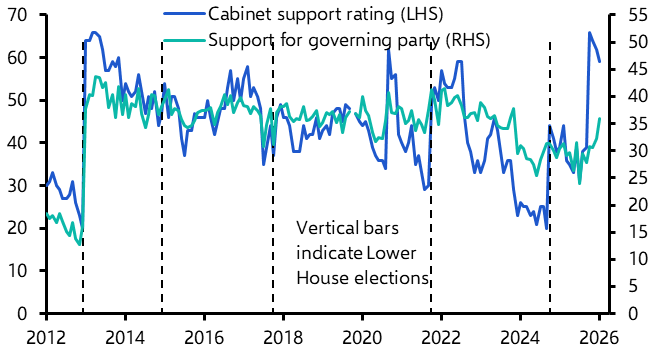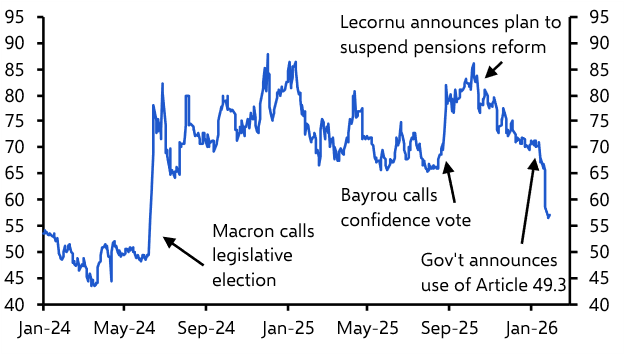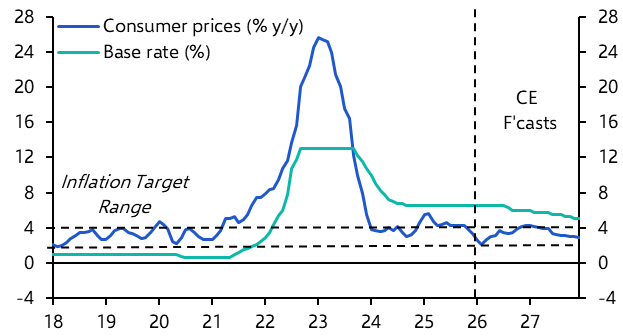For good reason, much of the attention around what another Donald Trump presidency would mean for the US economy has centred on his proposals to jack up tariffs and clamp down on immigration. If he wins in November and makes good on these pledges, you can expect lower US growth and higher inflation (all of our analysis on Harris versus Trump can be found here.)
But there would be a broader – and less tangible – consequence of another Trump administration, and it’s one that could have a far more profound effect on America’s global economic standing.
As we have noted before, while the era of hyper-globalisation is over, the world is not deglobalising. Indeed, the volume of world goods trade will likely hit a record high this year. Instead, the world is fracturing – geo-economic fragmentation, in the IMF’s language – into two blocs: one that aligns with the US and another that aligns with China. Trade and financial flows between these blocs will continue in many areas, but will be cut in others that are deemed to be geopolitically important. In this new, fractured, world, economic strength will be determined in part by a country’s alliances. While America has a lead on China in this regard, Trump’s policies threaten to alienate its key allies and undermine its current advantage.
Size isn’t everything
Consider the facts. As things stand, we estimate that about half of the world’s population live in China or countries that align with it. Similarly, about half the world’s population lives in the US or countries that align with it. (A full breakdown with downloadable charts and data showing these alignments, along with those countries that are unaligned, can be found in our Fracturing Dashboard.) But the economies aligned with the US are much larger than those that align with China; about two-thirds of the world’s GDP sits within the US bloc, while only around 30% sits within the China bloc. What’s more, the US bloc is much more economically diverse than the China bloc. It is made up of four broad groups of economies:
- High-end manufacturers and other technological leaders, including Japan, Germany, Taiwan and Korea.
- Global leaders in services, including the UK and the US itself.
- Emerging market manufacturers and other low-cost economies, including India, Mexico, Vietnam, the Philippines and Poland.
- Commodity producers, including Canada, Australia, New Zealand and Colombia.
In contrast, the China bloc is dominated by China itself and is otherwise made up of a series of large commodity producers, including Russia, Iran and Venezuela.
Friends from all walks
This is important because the US derives several benefits from the economic diversity of its bloc. It allows America (and its allies) to continue benefiting from the economics of comparative advantage while at the same time cutting ties with China in areas that are deemed to be geo-strategically important. This diversity means that, in instances where national security concerns lead to production being moved out of China, it can be shifted to other low-cost economies that are more aligned with the US, such as Vietnam or Mexico. This allows the US to retain the core benefits of globalisation and limits any pass-through to higher inflation and/or lower growth in America.
Diversity also increases the ability of the US to put the squeeze on China in some areas that it deems strategically important. A good example is the controls that have restricted China’s access to advanced semiconductors and the technologies used to produce them. Not all of this tech comes from the US – the vast majority of advanced semiconductors are manufactured in Taiwan, while the lithography machines used to produce them come from the Netherlands and Japan. But all of these countries are US allies. And, crucially, the Biden administration has been able to draw on a sense of shared values and common purpose to persuade governments – and therefore firms – in these countries to restrict sales of high-end tech to China. This would have been much harder to do if the US had imposed tariffs on European Union countries, or forced Taiwan to pay an “insurance premium” in exchange for US security guarantees – both of which are ideas Trump has pitched on the campaign trail.
How the alliance could fracture
A Trump victory would therefore threaten to undermine the coalition of countries that has formed around the US. This in turn would start to chip away at the key advantage that the US has over China – the size and economic diversity of its allies.
To be clear, a Trump victory would also pose problems for China. His pledge to impose a 60% tariff on all imports from China would pose a more immediate threat to its economy than the measures, including further tech controls, that are likely under Harris administration. One reason for this is that, unlike the tariffs imposed during the first Trump administration, the sheer size of the tariffs that are now being proposed would make them more difficult to counter through exchange rate adjustment. We estimate the renminbi would need to fall to 8.5/$ to offset the effect that a 60% tariff would have on the competitiveness of Chinese exporters – and an adjustment of that magnitude would threaten the stability of an already precarious financial system.
It is also the case that the reality of a second Trump presidency may fall short of his fiery campaign rhetoric. The range of potential outcomes are much greater under Trump than Harris, and this applies to the evolution of foreign relations as much as it does domestic policies. It is possible that a second Trump administration may have a less damaging effect on US foreign relations than seems likely at first sight.
But friends matter in a fractured world. Anything that Trump does to alienate America’s allies would hurt the US and benefit China. Taken to extreme, this could have a profound effect on America’s global economic standing over the long-run.
More on Trump and global fracturing
Our Fracturing page has all the critical analysis on the economic consequences of the breakdown in US-China relations. It includes recent analysis on what a Trump or Harris victory would mean for the Chinese economy and the latest on the Biden administration’s measures to restrict Chinese goods imports.




